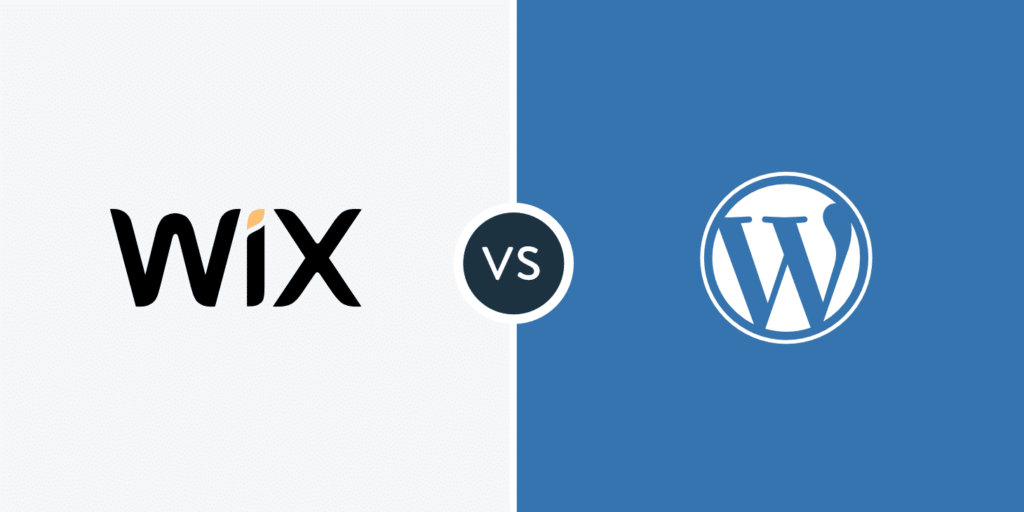WordPress vs. Wix is a common debate for anyone looking to create a website. Building a website has never been easier, thanks to the rise of intuitive website builders like WordPress and Wix. But when it comes to choosing the right platform, the decision can feel overwhelming. “WordPress vs. Wix” is a debate that countless individuals face when starting their online journey. Both platforms offer incredible features, but which one suits your needs? Let’s dive in and explore the key differences to help you make the right choice.
Table of Contents
WordPress vs. Wix: The Ease of Getting Started
When comparing WordPress vs. Wix, one of the first considerations is ease of use. Wix is known for its drag-and-drop interface, which allows users to design their websites visually, even without prior experience. It’s a true plug-and-play solution that’s perfect for beginners who want to see immediate results. Wix also offers a variety of pre-designed templates tailored to specific industries, making it ideal for users who need a quick and polished setup.
WordPress, on the other hand, may feel more complex at first. As an open-source platform, it provides limitless customization options, but it does require some learning. While WordPress beginners might find the interface less intuitive initially, the platform’s flexibility makes it worth the effort for those seeking a more robust and scalable website.
Design and Customization: How Creative Do You Want to Get with WordPress vs. Wix?
In the “WordPress vs. Wix” debate, design capabilities often take center stage. Wix offers over 800 templates, all professionally designed and mobile-responsive. The drag-and-drop functionality ensures that every element can be adjusted with precision. However, once you’ve chosen a template, you’re locked in, and switching designs later can be challenging.
WordPress takes customization to a whole new level. With thousands of free and premium themes available, users can create unique designs that align perfectly with their brand. Additionally, WordPress allows access to the backend code, empowering developers to tweak every aspect of their site’s appearance. Whether you want to use a theme as-is or start from scratch, WordPress provides the freedom to make your website truly your own.
Features and Functionality: Tailored Solutions for Every Need
If you’re looking for an all-in-one solution, Wix delivers many built-in features such as booking systems, e-commerce capabilities, and SEO tools. These are pre-integrated into the platform, eliminating the need for additional plugins or coding knowledge. This makes Wix a convenient option for small businesses, bloggers, or individuals who prioritize simplicity.
WordPress, on the other hand, is a powerhouse for functionality. Through its vast library of plugins (over 60,000 and counting), you can add nearly any feature imaginable. Whether it’s advanced SEO optimization, custom forms, or complex e-commerce solutions, WordPress has a plugin for it. This level of extensibility is unmatched, making WordPress the go-to choice for websites that require advanced functionality.
SEO Capabilities: Getting Found Online with WordPress vs. Wix
Search engine optimization (SEO) is crucial for driving traffic to your site. In the “WordPress vs. Wix” showdown, Wix has made significant strides in improving its SEO tools. The platform offers features like URL customization, meta tags, and integration with Google Analytics. For many users, Wix’s built-in SEO tools will suffice.
However, WordPress remains the gold standard for SEO. With plugins like Yoast SEO and All in One SEO, users can fine-tune every aspect of their optimization strategy. From creating XML sitemaps to managing breadcrumbs, WordPress gives users granular control over their SEO efforts. This makes WordPress a better choice for businesses and creators who want to dominate search engine rankings.
Cost: What’s the True Price of Convenience?
Cost is often a deciding factor in the “WordPress vs. Wix” debate. Wix offers tiered pricing plans, starting from free (with Wix branding) to premium packages that include hosting, a custom domain, and advanced features. The simplicity of Wix’s pricing structure is appealing, but costs can add up quickly as you scale.
WordPress itself is free to use, but it’s important to factor in the cost of hosting, premium themes, and plugins. While this can make WordPress more expensive initially, the long-term value often outweighs the investment. Users have greater control over their budget and can choose cost-effective solutions as needed.
E-Commerce: Selling with Confidence
For online stores, both platforms have their strengths. Wix’s e-commerce functionality is intuitive and integrated into its ecosystem, making it easy to set up a basic online store. Features like inventory management, payment processing, and shipping integrations are built-in, which is ideal for small businesses.
WordPress, with the WooCommerce plugin, offers unmatched e-commerce capabilities. It’s highly scalable and customizable, supporting complex product catalogs, dynamic pricing, and advanced shipping options. Whether you’re launching a small boutique or a large-scale enterprise, WooCommerce provides the tools to grow your business.
Scalability and Future Growth: Thinking Long-Term
When considering the future, scalability is a critical factor. Wix is an excellent choice for smaller projects or those with limited growth expectations. However, its closed ecosystem can become limiting for users who need more advanced capabilities or wish to move their site to another platform.
WordPress shines in scalability. From personal blogs to massive corporate websites, WordPress adapts to your needs as they evolve. Its open-source nature means you’re not tied to a single hosting provider or platform, giving you the freedom to expand without constraints.
Final Thoughts: WordPress vs. Wix – Which Platform is Right for You?
The choice between WordPress vs. Wix ultimately depends on your specific needs and goals. If you prioritize ease of use, quick setup, and minimal technical involvement, Wix is an excellent choice. However, if you’re looking for unparalleled customization, scalability, and control, WordPress is the clear winner.
Both platforms have their strengths, but understanding your priorities will guide you to the right decision. Whether you’re creating a personal blog, a business website, or an e-commerce store, the key is to choose a platform that aligns with your vision and supports your growth.

Extra Reading
If you found this blog on WordPress vs. Wix insightful, you’ll love diving deeper into the topic with our detailed guide titled “Wix vs WordPress: Which is the Best Platform for Building Your Website in 2024?”.
This comprehensive article takes a closer look at how these platforms are evolving and why certain features might make one a better fit for your website in 2024. It complements the insights shared here by offering updated perspectives, in-depth analysis, and actionable advice tailored for today’s rapidly changing digital landscape. Don’t miss out on learning which platform could give your online presence the edge it needs this year!
If you’re interested in how tools can enhance your website’s functionality, be sure to check out our blog titled “Small Business Tools: 7 Affordable API Solutions Every Entrepreneur Needs to Succeed”. One of the featured tools, Mailchimp, directly relates to WordPress by offering seamless integration with the platform.
This connection highlights how WordPress can work hand-in-hand with advanced APIs to automate email campaigns and elevate your marketing strategy. Together, these blogs showcase how choosing the right platform and leveraging smart tools can set your business up for success. Don’t miss the chance to explore more ways to maximize your website’s potential!


